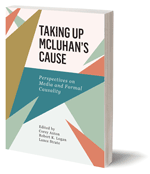So, while I'm on the subject of books published relatively recently, as per my previous post,
Mandarin McLuhan and Media Ecology, I would like to share with you the publication of an anthology that I co-edited along with my media ecology colleagues, Corey Anton and Bob Logan.
But first, let me remind that back in 2011, in conjunction with NeoPoiesis Press, I helped to get Media and Formal Cause by Marshall and Eric McLuhan published. It is, of course, required reading for any card carrying media ecologist, and on the off off chance you don't have a copy, well, here:
ºººººººººººººººººººº
ºººººººººººººººººººº
You can also read my posts here on Blog Time Passing introducing the book back in 2011, Media and Formal Cause and Media and Formal Cause in Effect!, and see also Artforum Informs that Media and Formal Cause is 1 of the 10 Best of 2011 why don't you?
Now then, this little book was considered such a big breakthrough in understanding McLuhan, and providing a new way of understanding our understanding of media, and the kinds of media effects we tend to be concerned with in the field of media ecology, that it generated a great deal of interest and ferment in the field.
For some, it meant a retrieval of Aristotelian metaphysics, for others a link back to Thomas Aquinas and Thomist philosophy, and for some a link forward to systems theory and the concept of emergence. And given all the interest that has been generated, a follow-up volume was inevitable, hence the anthology we co-edited, Taking Up McLuhan's Cause: Perspectives on Media and Formal Causality (do you like the pun in "taking up McLuhan's cause"? I came up with it).
And here's a nice review blurb that we received:
Not too shabby, huh? Well, that's all the good news, but now here's the bad news:
The anthology is published by Intellect out of the UK, and distributed in the US by the University of Chicago Press. Here's the blurb that goes with it:
This book brings together a number of prominent scholars to explore a relatively under-studied area of Marshall McLuhan’s thought: his idea of formal cause and the role that formal cause plays in the emergence of new technologies and in structuring societal relations. Aiming to open a new way of understanding McLuhan’s thought in this area, and to provide methodological grounding for future media ecology research, the book runs the gamut, from contributions that directly support McLuhan’s arguments to those that see in them the germs of future developments in emergent dynamics and complexity theory.
And here is the listing of the books contents:
Foreword
Eric McLuhan
A Trialogic Introduction
Robert K. Logan, Corey Anton, and Lance Strate
Chapter One: The Form of Things to Come: A Review of Media and Formal Cause
Corey Anton
Chapter Two: McLuhan, Formal Cause and the Future of Technological Mediation & Postscript
Corey Anton
Chapter Three: Medium as ‘Metaform’: An Inquiry into the Life of Forms
Paolo Granata
Chapter Four: From Aristotle via Aquinas: Understanding Formal Cause in Marshall McLuhan’s Philosophy
Laura Trujillo Liñán
Chapter Five: The Effects That Give Cause, and the Pattern That Directs
Lance Strate
Chapter Six: McLuhan and Causality: Technological Determinism, Formal Cause and Emergence
Robert K. Logan
Chapter Seven: Formal Cause: McLuhan’s ‘Objective Turn’?
Yoni Van Den Eede
Chapter Eight: Forms of Causality
Chad Hansen
Chapter Nine: Anti-Environmental Art and Its Role in Making Formal Cause Visible
Steve Reagles
Chapter Ten: Of Memes, Modes, Minor Audiences and Formal Cause
Eric S. Jenkins
Chapter Eleven: After Effects, Before Causes: Technique, Artistic Intent and Formal Causality
Kirk Zamieroski
Chapter Twelve: Re-Cognizing Formal Cause
Peter Zhang
Chapter Thirteen: Disrobing the Probe, Unpacking the Sprachage: Formal Cause or the Cause of Form Reframing McLuhan and the Kabbalah
Adeena Karasick
And here's a nice review blurb that we received:
'Very good essays on a crucial intellectual topic. I’m hopeful that this anthology will help kick off another McLuhan movement rooted in McLuhan’s place in the great tradition of philosophies of causation. ' – Graham Harman, American University in Cairo
Not too shabby, huh? Well, that's all the good news, but now here's the bad news:
ºººººººººººººººººººººººººººººººººººººººº












